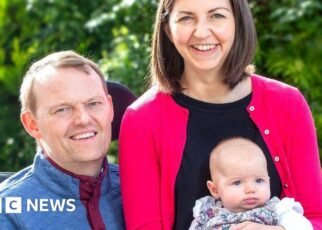[ad_1]
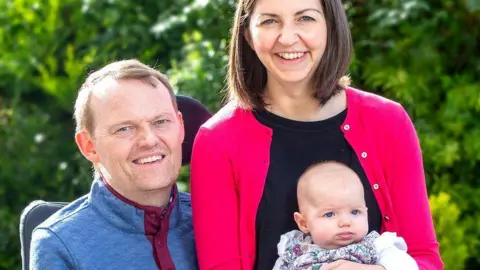 My Name’5 Doddie Foundation
My Name’5 Doddie FoundationWhen Scott Stewart was diagnosed with motor neurone disease (MND), he knew he wanted to keep working to support his family.
His reduced mobility meant he had to give up his job as a careers adviser but he was able to fall back on a side-hustle, selling golf equipment online.
Two years since his diagnosis, the 42-year-old now runs the eBay business from his home in Stirling with the help of his parents, Alison and Iain.
The work is good for his mental health and allows the married father-of-one to contribute to his family’s expenses.
“I have a family to support and I need to be able to help them as much as possible,” he said.
“Nobody opens a chequebook when you receive an MND diagnosis – you need money to get by, and so does your family.”
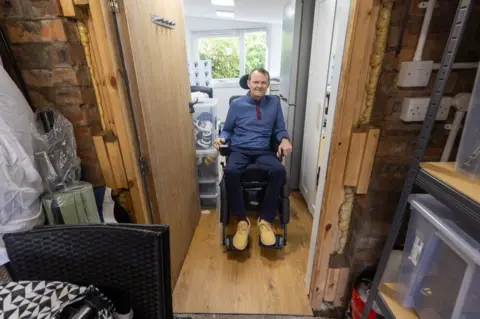 My Name’5 Doddie Foundation
My Name’5 Doddie FoundationMND is progressive and causes muscle weakness, stiffness, and paralysis that gets worse over time.
There is currently no effective treatment or cure for the condition that affects the brain and nerves.
Scott, who was once a scratch golfer, set up the business selling golf accessories during the pandemic while on furlough.
Now in a wheelchair, he continues to list items to sell online while his mother and father, both 76, volunteer to take them to the Post Office for delivery.
They take it in turns to live with Scott and his wife, Robyn, and their four-month-old daughter, Rae.
Scott spent his life savings on adapting the family home to fit his needs, and he now receives £170 a week in disability allowance but it is all used to pay for a Motability vehicle.
Robyn is currently on maternity leave from her job as a programme manager for Public Health Scotland.
She said: “I can’t put into words just how special life has been since I met Scott. We have had some great adventures together.
“However, I can’t sugar coat it, receiving that kind of diagnosis, and realising there is currently nothing you can do to cure or make it better for your loved one is the hardest thing.
“Watching the person you love struggle physically as MND takes hold, and being able to do very little to stop it is heart breaking.”
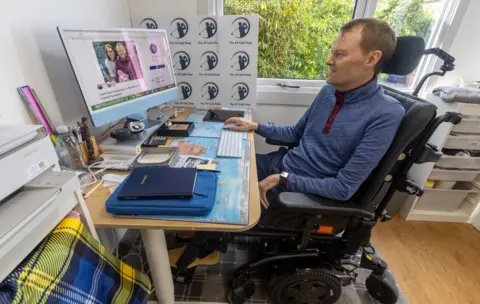 My Name’5 Doddie Foundation
My Name’5 Doddie FoundationScott says that working gives him purpose and focus, and fire in his belly to keep on going.
He continues to adapt his working life as his condition progresses.
“There is no handbook. It’s not written down anywhere. You’re just flying by the seat of your pants and finding things out as you go along and a lot of it is experience,” he said.
But he plans to keep working and striving until his body doesn’t allow him any more.
And he finds work stops him dwelling on his situation.
“We all want a place where we don’t have to work and someone puts their arm around you and tells you everything will be OK but sadly we know that is not the case in any walk of life.
“Nobody gets an arm put around them.”
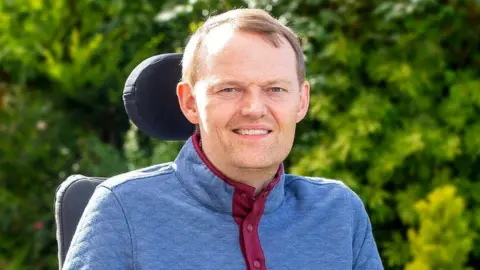 My Name’5 Doddie Foundation
My Name’5 Doddie FoundationHe says he would rather work for a living than rely on charitable donations, which could be directed into researching the disease.
“There is a fine balance between knowing any breakthrough in medicine will probably not benefit me, it will benefit other people in the future and I’m very much at peace with that,” he said.
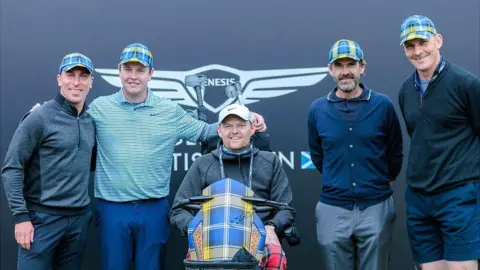 Calum Huntington
Calum HuntingtonNicola Roseman, chief executive at My Name’5 Doddie Foundation, said MND affected everybody differently, but it almost always leads to a need for adaptations to homes, vehicles, personal, and professional lives – impacting finances.
“It means a significant number of people diagnosed with MND carry on working for longer than they would choose to make ends meet, to support their family, and to cover the cost of the changes they must make due to the disease,” she said.
Scott managed to travel earlier this year on a trip to Augusta for the US Masters and he was a guest starter at the Scottish Open Golf at Renaissance Club.
“I’ve experienced some amazing things this year, but I know none of it would have happened if I wasn’t dying, and I’d swap it all for that not to be the case,” he said.
“There is no way in this day and age that people should need to face such a bleak outlook, and it’s up to everybody to get out there and help drive that change.”
[ad_2]
Source link
